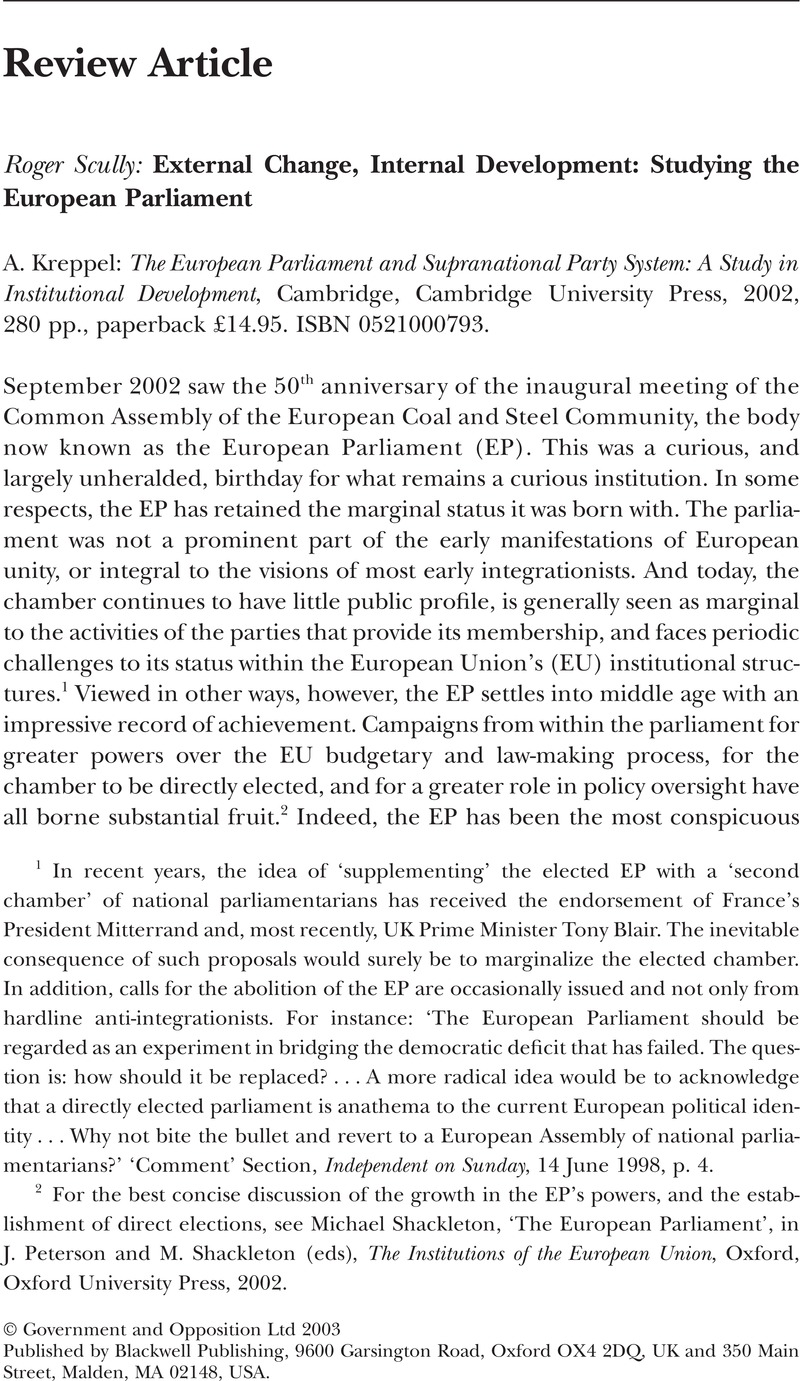No CrossRef data available.
Published online by Cambridge University Press: 28 March 2014

1 In recent years, the idea of ‘supplementing’ the elected EP with a ‘second chamber’ of national parliamentarians has received the endorsement of France's President Mitterrand and, most recently, UK Prime Minister Tony Blair. The inevitable consequence of such proposals would surely be to marginalize the elected chamber. In addition, calls for the abolition of the EP are occasionally issued and not only from hardline anti-integrationists. For instance: ‘The European Parliament should be regarded as an experiment in bridging the democratic deficit that has failed. The question is: how should it be replaced? …A more radical idea would be to acknowledge that a directly elected parliament is anathema to the current European political identity … Why not bite the bullet and revert to a European Assembly of national parliamentarians?’ ‘Comment’ Section, Independent on Sunday, 14 06 1998, p. 4 Google ScholarPubMed.
2 For the best concise discussion of the growth in the EP's powers, and the establishment of direct elections, see Shackleton, Michael, ‘The European Parliament’, in Peterson, J. and Shackleton, M. (eds), The Institutions of the European Union, Oxford, Oxford University Press, 2002 Google Scholar.
3 Among numerous examples are Tsebelis, George, ‘The Power of the European Parliament as a Conditional Agenda Setter’, American Political Science Review, 88 (1994), pp. 128–42CrossRefGoogle Scholar; Moser, Peter, ‘The European Parliament as a Conditional Agenda Setter. What are the Conditions? A Critique of Tsebelis (1994)’, American Political Science Review, 90 (1996), pp. 834–8CrossRefGoogle Scholar; Garrett, Geoffrey and Tsebelis, George, ‘An Institutional Critique of Intergovernmentalism’, International Organization, 50 (1996), pp. 269–99CrossRefGoogle Scholar; Scully, Roger, ‘The EP and the Co-Decision Procedure: A Reassessment’, Journal of Legislative Studies, 3 (1997), pp. 58–73 CrossRefGoogle Scholar; and Rittberger, Berthold, ‘Impatient legislators and New Issue-dimensions: a Critique of the Garrett–Tsebelis ‘standard version’ of legislative politics’, Journal of European Public Policy, 7 (2000), pp. 554–75CrossRefGoogle Scholar.
4 Corbett, Richard, The European Parliament's Role in Closer Integration, London, Macmillan, 1998 CrossRefGoogle Scholar. Corbett is now a Labour MEP for Yorkshire, but previously worked for the parliament's staff.
5 Hix, Simon, ‘Constitutional Agenda-Setting Through Discretion in Rule Interpretation: Why the European Parliament Won at Amsterdam’, British Journal of Political Science, 32 (2002), pp. 259–80CrossRefGoogle Scholar. Hix examines in particular how the EP was able to induce governments to revise the ‘co-decision’ legislative procedure, first introduced in the Maastricht Treaty, in a manner beneficial to the EP in the subsequent Amsterdam Treaty.
6 Rittberger, Berthold, ‘The Creation and Empowerment of the European Parliament: Delegation of Powers to a Majoritarian Institution’, Journal of Common Market Studies, Special Issue on The European Parliament at Fifty, 2003 CrossRefGoogle Scholar, edited by Simon Hix and Roger Scully, forthcoming.
7 Mezey, Michael, ‘Legislatures: Individual Purpose and Institutional Development’, in Finifter, A. (ed.), Political Science: The State of the Discipline II, Washington, American Political Science Association, 1993, p. 357 Google Scholar.
8 See Corbett, Richard, Jacobs, Francis and Shackleton, Michael, The European Parliament, 4th edition, London, John Harper, 2000 Google Scholar; Westlake, Martin, A Modern Guide to the European Parliament, London, Continuum, 1994 Google Scholar.
9 See, in particular, van der Eijk, Cees and Franklin, Mark (eds), Choosing Europe? The European Electorate and National Politics in the Face of Union, Ann Arbor, University of Michigan Press, 1996 CrossRefGoogle Scholar.
10 See Mair, Peter, ‘The Limited Impact of Europe on National Party Systems’, in Goetz, K. and Hix, S. (eds), Europeanised Politics? European Integration and National Political Systems, London, Frank Cass, 2001 Google Scholar, Ladrech, Robert (ed.), The Europeanization of Party Politics, Special Issue of Party Politics, 8: 4 (2002)Google Scholar.
11 Though see Raunio, Tapio, ‘Losing Independence or Finally Gaining Recognition? Contacts Between MEPs and National Parties’, Party Politics, 6 (2000), pp. 211–24CrossRefGoogle Scholar.
12 See Scully, Roger, ‘Democracy, Legitimacy and the European Parliament’, in Cowles, M. Green and Smith, M. (eds), The State of the European Union, Vol. 5, Oxford, Oxford University Press, 2000 Google Scholar, where I note the finding of much comparative research on parliaments that indicates that powerful chambers lacking much public support have proven highly vulnerable to attacks on their prerogatives.
13 This is explored in some depth in Blondel, Jean, Sinnott, Richard and Svensson, Palle, People and Parliament in the European Union: Participation, Democracy and Legitimacy, Oxford, Clarendon Press, 1998 CrossRefGoogle Scholar; they conclude that the EP suffers from a ‘failure to even begin to penetrate the consciousness of so many of its electors’ (p. 242).
14 Scully, Roger, ‘Voters, Parties and Europe’, Party Politics, 7 (2001), 521 CrossRefGoogle Scholar. It is only fair to add that the work of several scholars, including Christopher Anderson, Matthew Gabel and Robert Rohrschneider, is starting to make this complaint out-dated.
15 See Gabel, Matthew, ‘Public Support for the European Parliament’, Journal of Common Market Studies, Special Issue on The European Parliament at Fifty, 2003 CrossRefGoogle Scholar, edited by Simon Hix and Roger Scully, forthcoming.
16 See Coombes, David, Seven Theorems in Search of the European Parliament, London, Federal Trust, 1999 Google Scholar.